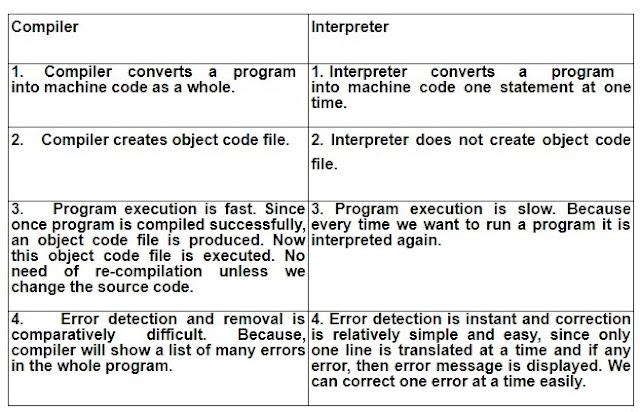Programming
What is a Computer..
- A computer is an electronic device that manipulates information, or data. It has the ability to store, retrieve, and process data.
What can the computers do?
- accepts data as input, processes that data using programs, and outputs the processed data.
What is Data?
- Data are basic values or facts
- Eg:
- Numbers
- Characters
- Symbols
- Marks of a subject
What is Process?
- A process or running process refers to a set of instructions currently being processed by the computer processor.
- Every process are done by processor(CPU).
- Information is organized or classified data, which has some meaningful values.
- Processed Data call by Information.
Programming Fundamentals
What is Programming Language...
- We are well aware of English Language, which is a well-known Human Interface Language. English has a predefined grammar, which needs to be followed to write English statements in a correct way. Likewise, most of the Human Interface Languages (Hindi, English, Spanish, French, etc.) are made of several elements like verbs, nouns, adjectives, adverbs, propositions, and conjunctions, etc
- Similar to Human Interface Languages, Computer Programming Languages are also made of several elements. We will take you through the basics of those elements and make you comfortable to use them in various programming languages
Why are there so many programming languages?
- Every programming language aims to solve a particular problem. More than one language might be able to solve the same problem, but each will approach it differently.
What are the types of programming languages?
- Low level language
- High level language
- The Effect of Computer Language on Human·Computer Interaction. This diagram depicts the relative contribution of computer language to the Interface between humans and computers.
- 1st generation programming languages(1GL)
- Machine language (1,0)
- 2nd generation programming languages(2GL)
- Assembly language
- There are sometimes used in kernels
- Hardware and soft wares interact between them by using kernel
- 3rd generation programming languages(3GL)
- C,C++,Java,Javascript
- 4th generation programming languages(4GL)
- Perl,PHP,Python,Ruby,SQL
Differences between Low level language and High level language
Translators
- A programming language is a set of rules that provides a way of telling a computer what operations to perform.
- The computer only know machine language (1,0). But instructions are written in high level language.that's called source code.so we need to translate the source into machine code to execute the program.for this purpose we use compiler or interpreter.
Compiler VS Interpreter
Web development
- Front-end development
- Programming of visual user interfaces, including its aesthetics and layouts. A front-end developer code runs on a web browser, on the computer of the user of the site
- Front-end languages
- HTML
- CSS
- Javascript
- JQuery
- AngularJS
- BootStrap
- Back-end development
- Back-end Development refers to the server-side and database development. It is the term used for the behind-the-scenes activities that happen when performing any action on a website.
- Back-end languages
- Java
- Ruby
- Perl
- Python
- SQL
- PHP






Super explanation with pictures...
ReplyDeleteThank you da
DeleteVery Nice & Grate work...
ReplyDeleteThank you Nithi
Delete